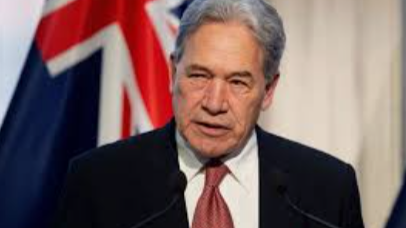Last week Radio New Zealand reported a disturbing incident, and I quote the report in full.
Quote.
China's decision to launch an intercontinental ballistic missile into the Pacific Ocean is "concerning", the foreign affairs minister and a foreign policy expert says.
It is the first time China has launched a missile into the Pacific Ocean in the past 44 years.
China launched the missile, carrying a dummy warhead, yesterday afternoon New Zealand time and at 8.44 am Beijing time.
The Chinese defence ministry said in a statement the missile was part of a "routine arrangement in our annual training plan", and that it was not directed at any country or target.
The missile "fell into expected sea areas", the statement said.
Minister of Foreign Affairs Winston Peters said the missile launch was an unwelcome "and concerning development".
"We remain in the process of gathering further information," Peters said in a statement.
"However, as reported, China has conducted a long-range ballistic missile test terminating in the South Pacific.
"Pacific Leaders have clearly articulated their expectation that we have a peaceful, stable, prosperous, and secure region. As part of the region, New Zealand strongly supports that expectation."
Peters said he had engaged with Pacific partners over the missile launch, and will continue to in the coming days.
A Japan Coast Guard official said it received a navigation warning from China on Monday for "space debris" in three zones in the South China Sea and the Pacific north of the Philippines' Luzon island in the South Pacific on Wednesday, Reuters reported.
Associate professor of politics at the University of Otago, Nicholas Khoo, said the launch was disturbing for New Zealand, and jeopardised stability in the Asia-Pacific region.
"The fact that the missile landed in the South Pacific should actually send a signal to New Zealand that we are now well into an era of great power competition, and we really need to wise up to all of this."
He said China launched missile tests regularly within the country's territory and other isolated areas, but not in the South Pacific.
"This is a big deal.
"This sets a precedent where the Chinese [government] will think they can do this testing on a regular basis, which is the reason why there needs to be a regional response."
He said the missile launch was designed to send a "very clear signal" that China had security interests in the Asia-Pacific region that it wanted to defend.
Khoo said a territorial dispute between China and the Philippines in the South China sea had been escalating over the past couple of months, as had a long-standing dispute between China and Japan over the Senkaku Islands in the East China sea.
He said the relationship between the United States and China has also changed from a policy of "engagement to strategic competition".
Ankit Panda, senior fellow at the Carnegie Endowment for International Peace in Washington D.C, said the last time a missile was launched in the South Pacific was May 1980, so it was highly unusual.
He said the missile tests could be designed to show China's nuclear capabilities are still credible.
The branch of the Chinese military charged with operating these missiles in recent years has seen a leadership purge and has come under scrutiny for corruption, he said.
"This kind of a test could be designed to bolster morale communicate to internal audiences that China's nuclear capabilities remain relevant, it also communicates to its to outside stakeholders, including the United States, that China's nuclear capabilities remain as credible as they've always been."
Panda said the United States had also been warned about the long-range missile test, and that it might not have been fuelled by geopolitical tensions.
"The United States, the United Kingdom, the French - to a lesser extent the Russians - do carry out this kind of testing regularly. The US tests its own ICBMs (Intercontinental ballistic missiles) into the Pacific.
"You could make the argument this is actually the kind of testing the US would want to see from China, and the Chinese did issue warnings to mariners and airmen which are generally-speaking the kind of practices you would want to see from a country carrying out these kind of long-range tests."
But he agreed the big question was whether these types of tests would become more regular.
The Chinese Embassy has been approached for comment.
End of Quote.
Yours sincerely
Frank Short.
www.solomonislandsinfocus.com



